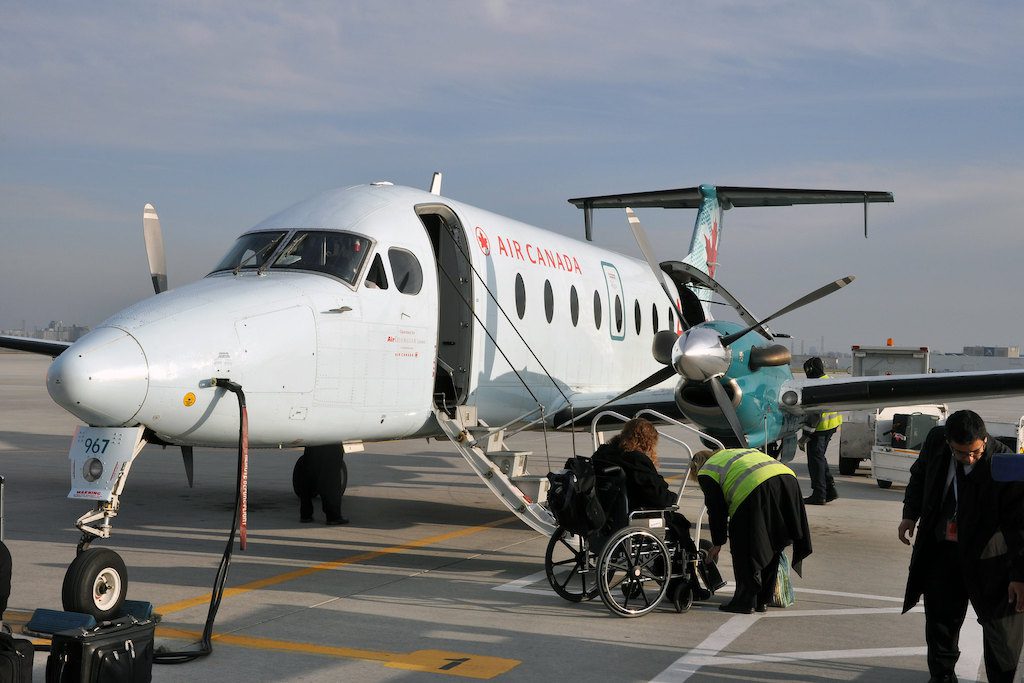Business Travel Is Becoming a Bigger Obstacle for Employees with Disabilities

Skift Take
 Technology has freed up many employees to work remotely, allowing them to check in via email or Slack, and to virtually attend meetings through video conferencing. Meanwhile, it’s easier than ever for companies to set up satellite offices in cities around the globe. Face-to-face contact is still valued highly, so as employees get more spread out, business travel is on the rise.
Technology has freed up many employees to work remotely, allowing them to check in via email or Slack, and to virtually attend meetings through video conferencing. Meanwhile, it’s easier than ever for companies to set up satellite offices in cities around the globe. Face-to-face contact is still valued highly, so as employees get more spread out, business travel is on the rise.
With business travel becoming more frequent, employees with disabilities are at a disadvantage. Accessibility is often not a high priority among travel companies, despite the fact that over a quarter of people in the U.S. live with disabilities.
Michael Swiatek, chief strategy and planning officer at Avianca, has worked in the airline industry for 25 years and seeks to raise awareness about the importance of accessibility for business travelers. He believes that the situation will only improve once travel companies start to realize how widespread the issue is.
Plus, we take a deeper look at Expedia following former CEO Mark Okerstrom’s abrupt departure.
Read this story, and many more, below.
If you have any feedback about the newsletter or news tips, feel free to reach out via email at ic@skift.com or tweet @ikcarey.
— Isaac Carey, Travel Reporter
Featured Stories
 Business Travelers With Disabilities Face a Pervasive Lack of Accessibility: Despite the growing number of people with disabilities in the United States, it's still a challenge to find clear information about accessibility while traveling. This may make traveling so difficult for employees with disabilities that many choose to do it as little as possible.
Business Travelers With Disabilities Face a Pervasive Lack of Accessibility: Despite the growing number of people with disabilities in the United States, it's still a challenge to find clear information about accessibility while traveling. This may make traveling so difficult for employees with disabilities that many choose to do it as little as possible.
Huge Reorg at Expedia, CEO Out, Diller Takes Over: Well, this is a surprise. Expedia’s two top executives resign unexpectedly. And Barry Diller moves in.
The Rise and Fall of Mark Okerstrom as Expedia CEO: Mark Okerstrom’s time as CEO of Expedia Group ended abruptly Wednesday after merely two years. Here’s a recap of Okerstrom’s tenure and why controlling investor Barry Diller felt Okerstrom failed to keep an eye on the ball.
What Does Online Travel Really Mean by a ‘Connected Trip’? Creating the connected trip means online travel agencies will have to become high-powered, tech-first, traditional travel agencies. It sounds cool but probably isn’t feasible without major upheaval across the global travel market.
The Future Of Travel
Selina Hotels Step Up Against WeWork in Latin America: WeWork’s co-working model may be fledgling, but hotels are putting a twist on the concept to connect locals and digital nomads.
Lufthansa’s Potential $6.4 Million Fine Is One More Reason Euro Airlines Want to Forget 2019: Like many other European airlines, it’s been a pretty tough year for Lufthansa. The airline could probably do without a potential FAA fine hanging over it as it tries to start fresh in 2020.
The Reinvention of Allegiant Air: Long among the world’s most profitable airlines, Allegiant seeks even greater riches with a mix of old tricks and new ideas. Some, in fact, have nothing to do with air service..
Travel Reporter Isaac Carey [ic@skift.com] curates the Skift Corporate Travel Innovation Report. Skift emails the newsletter every Thursday.
Subscribe to the Free Skift Corporate Travel Innovation Report




